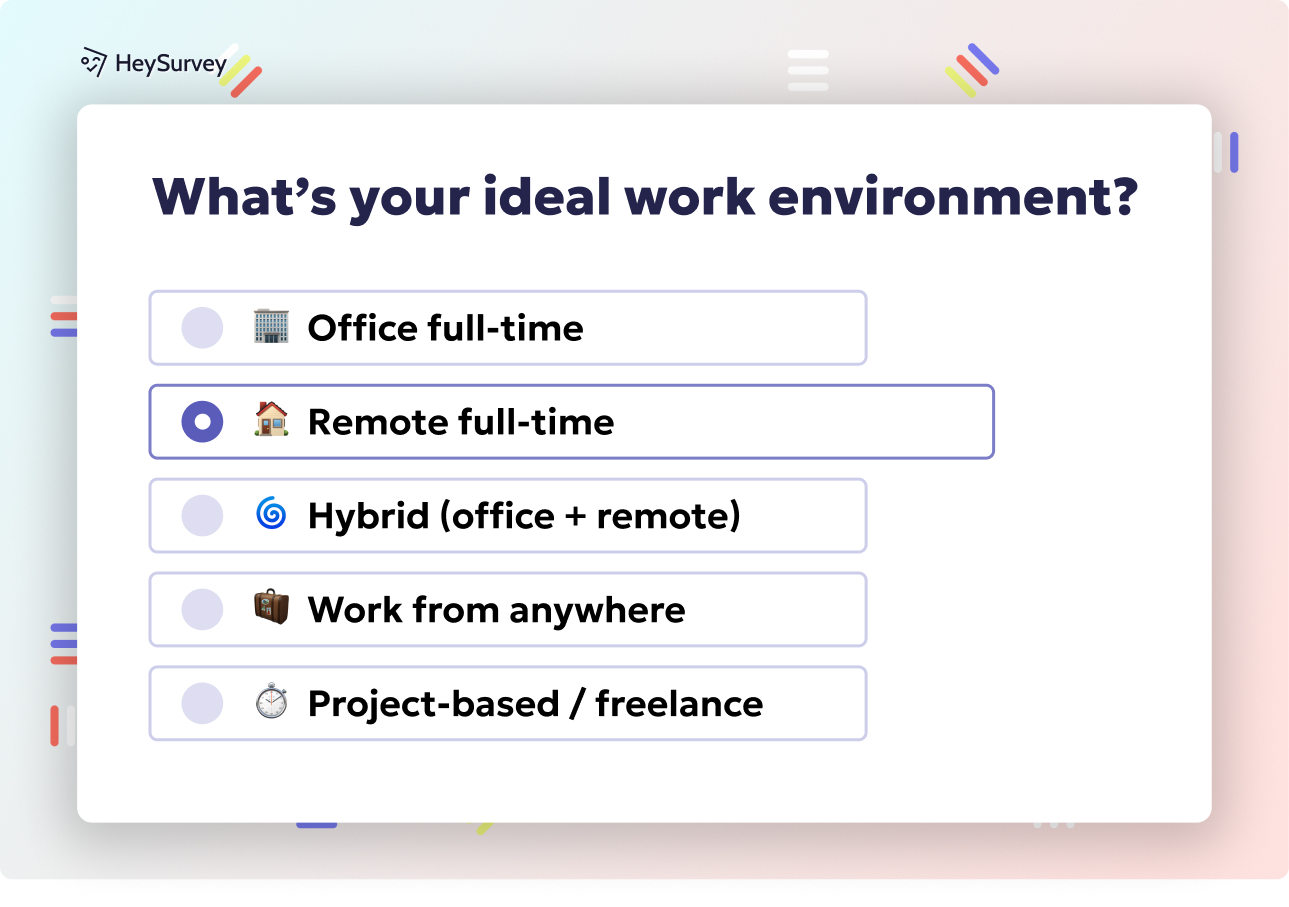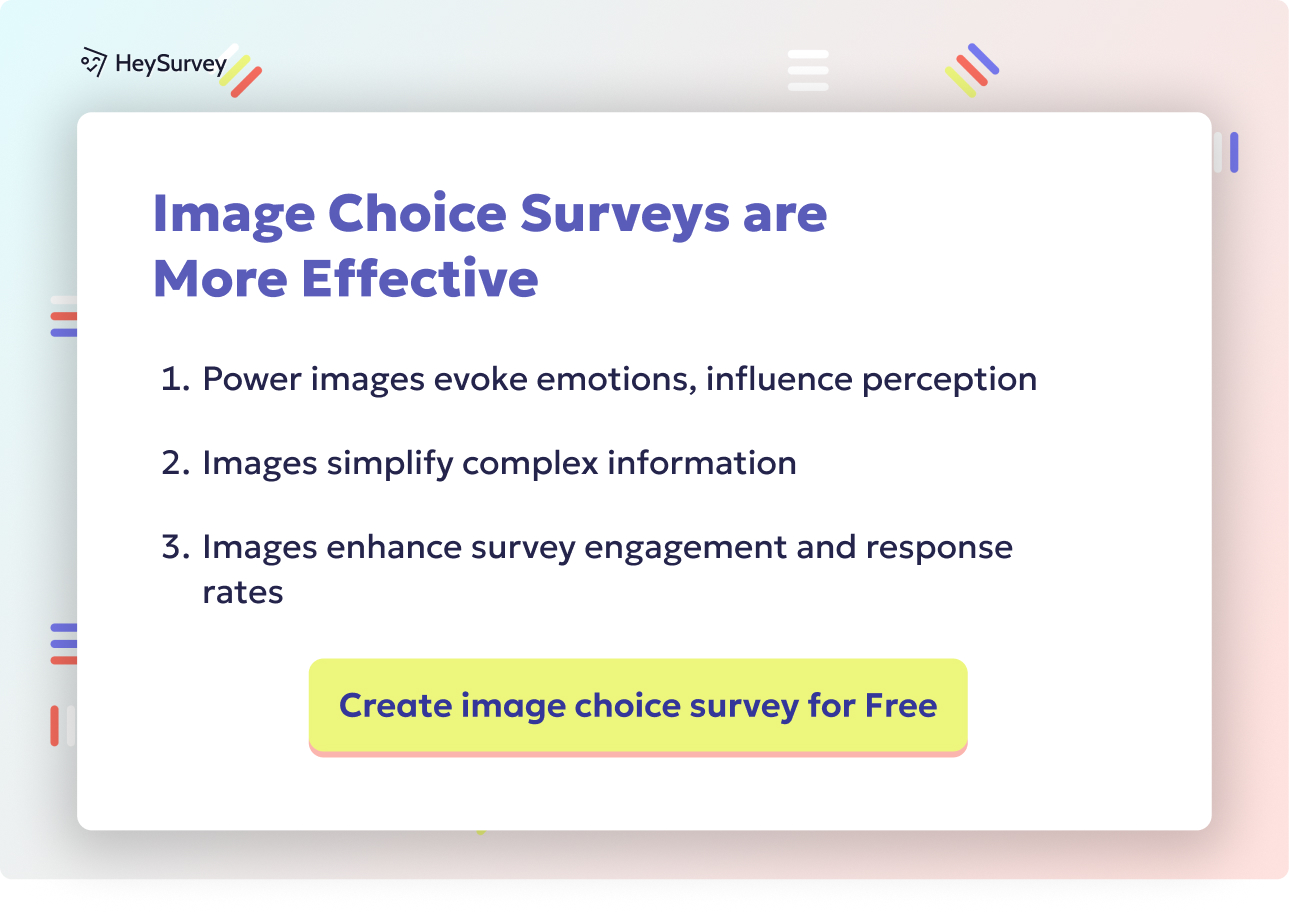32 Essential Health Survey Questions for Better Data Collection
Explore 30 expert health survey questions across demographics, lifestyle, mental health, and more to gather accurate, actionable health data.
Health surveys aren't just about filling in bubbles or ticking the right boxes—they're essential tools that help teams, clinics, and organizations paint a clear picture of community well-being. Strong health survey questions drive evidence-based choices, ensuring resources actually get where they’re needed most. Whether you’re designing a short poll or a lengthy nationwide assessment, picking the perfect question type can make or break your results. You’ll notice we cover everything from demographic health surveys to patient satisfaction, and even workplace wellness, so you’ll leave this page with a toolkit for any health data challenge.
Demographic Health Surveys
What Are Demographic Health Surveys?
Demographic health surveys are like the sturdy foundation of any robust research project. These surveys gather baseline population data—think age, gender, income, and ethnicity—that lets you clearly identify who’s being impacted and in what ways. You can spot trends, uncover health disparities, and ensure health initiatives actually reach everyone, not just a privileged few.
Demographic surveys are the backbone for public-health agencies and large healthcare providers. Understanding “who” makes it easier to tailor interventions for “what” and “why.” If you’re segmenting responses, evaluating healthcare equity, or tracking long-term trends, a demographic snapshot is non-negotiable.
Why Are Demographic Health Surveys Important?
Organizations use demographic questions for health surveys right at the start of:
- National or regional health studies.
- Community needs assessments.
- Any project seeking to find disparities by race, age, gender, or income.
- Long-term program tracking.
Because population growth, urbanization, social change—or even events like pandemics—impact health outcomes differently across groups, these questions matter for targeted action.
Demographic Health Survey Sample Questions
Demographic questions should be respectful, inclusive, and value privacy. Here are examples:
What is your age in completed years?
How do you currently describe your gender identity?
Which race or ethnicity best describes you? (Select all that apply)
What is the highest level of education you have completed?
What is your current annual household income?
If your organization is measuring health equity data collection, these questions are your “must-have” first step. Skipping good demographic data is like baking a cake and forgetting the flour.
Inclusive demographic data collection in health surveys is essential to accurately identify and address health disparities among LGBTQIA2S+ individuals. (pubmed.ncbi.nlm.nih.gov)
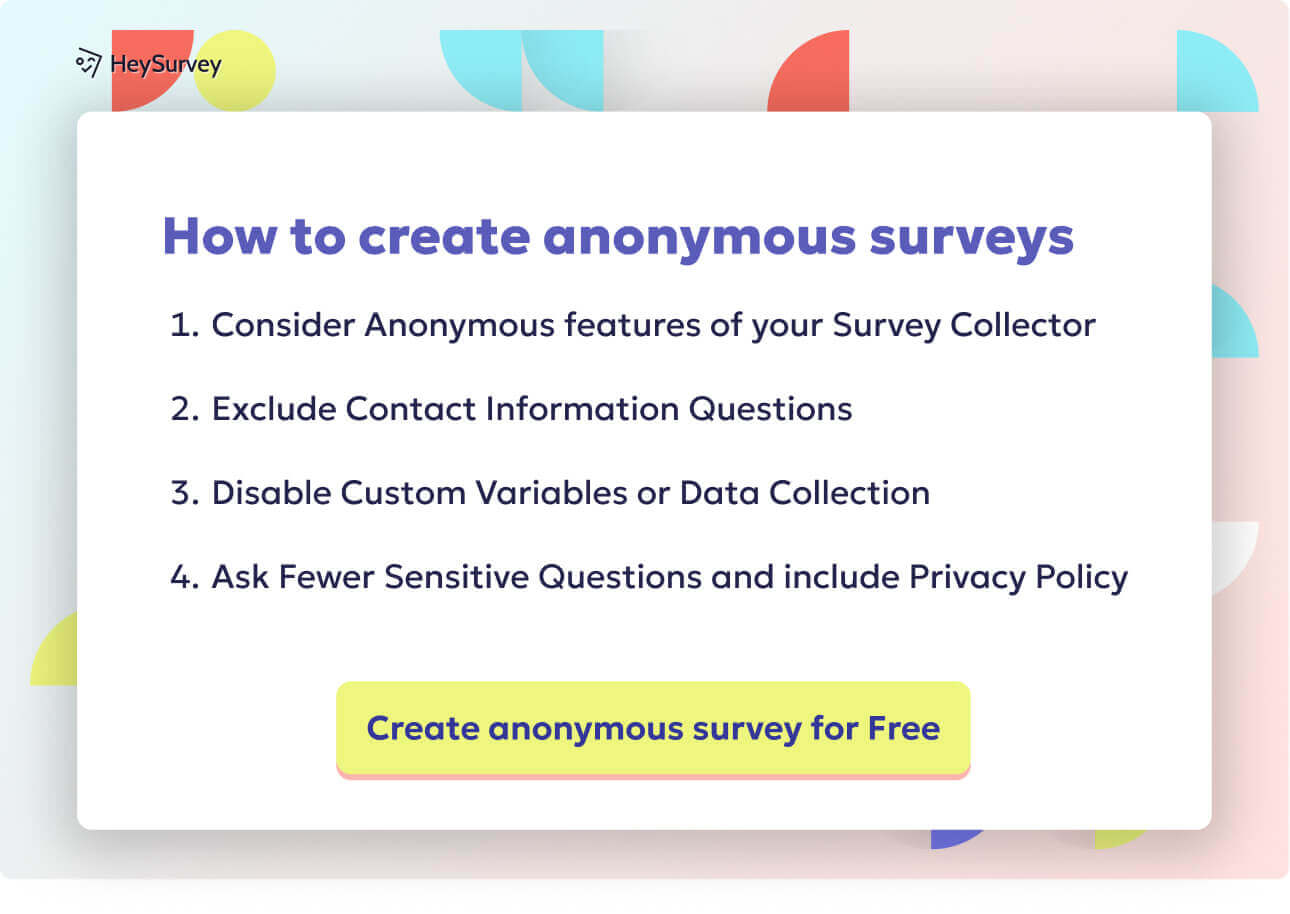
Creating your health survey with HeySurvey is easier than brewing your morning coffee—let’s break it down in three simple steps!
Step 1: Create a New Survey
- Head over to HeySurvey and click on “Create New Survey.”
- You can start from scratch with a blank sheet or jumpstart your survey by choosing a pre-built template designed for health topics.
- Give your survey a name (something catchy and clear) so it’s easy to find later.
Pro tip: If you’re reading this article on the HeySurvey website, just hit the button below to open a ready-made template and start customizing without the wait.
Step 2: Add Your Questions
- Click the “Add Question” button either at the top or where you want new questions to appear.
- Choose the question type that fits your needs—multiple choice, text answer, scale, dropdown, and more.
- Type in your health survey questions, add descriptions or images if you want to jazz things up.
- Mark questions as required if you want to make sure nobody skips a key detail.
Need to get fancy? Use branching to skip certain questions based on previous answers so the survey feels tailored to each respondent.
Step 3: Publish Your Survey
- Preview your masterpiece by clicking “Preview” to see exactly how participants will experience it.
- When everything looks good, hit “Publish”. You’ll get a sharable link to distribute your survey anywhere you want.
- Remember, an account is required to publish and view responses, so if you haven’t already, signing up is a must.
Bonus Step A: Apply Your Branding
- Upload your logo to personalize the survey’s header, making it feel extra professional and on-brand.
- Customize colors, fonts, and backgrounds from the Designer Sidebar to reflect your organization’s style.
Bonus Step B: Define Survey Settings
- Set your survey’s start and end dates to control when it’s live.
- Limit the number of responses if you want to keep things tidy.
- Configure a redirect URL to send respondents someplace special after completing the survey.
Bonus Step C: Use Branching for Smart Flow
- Use branching logic to send participants on different paths depending on their answers.
- This creates a personalized journey, making surveys shorter and more engaging for each respondent.
That’s it! With HeySurvey, you’re just a few clicks away from gathering the insightful health data you need. Ready to make your survey? Tap the button below for a template tailored to this article and get started right now!
Lifestyle & Behavior Health Surveys
Understanding Lifestyle and Behavior in Health
Lifestyle health survey questions are where things get personal. These surveys dig into daily choices—food, movement, sleep, and those sneaky-and-not-so-sneaky habits, like smoking or drinking. Why? Our behaviors fuel our health, for better or worse.
Academic researchers, wellness program leaders, and disease-prevention teams all rely on behavioral risk factor questionnaires to get the facts behind the headlines. Are people really eating their veggies? Counting their steps? Or is reality, as often happens, “not so much”?
These surveys are superstars in pinpointing root causes of chronic diseases like heart disease, diabetes, and obesity.
Why & When to Use Lifestyle & Behavior Surveys
It’s not about judging, it’s about measuring what matters so programs and interventions don’t waste time (or funds). Use these surveys if you need to:
- Design effective workplace wellness programs.
- Build public health campaigns to nudge better nutrition.
- Link daily habits to population-level outcomes in research studies.
- Tailor disease prevention to those who need a little extra nudge.
Lifestyle & Behavior Health Survey Sample Questions
You’ll want to strike a balance—get honest answers, but keep it friendly!
On average, how many servings of fruit and vegetables do you eat per day?
During the past week, how many days did you engage in at least 30 minutes of moderate physical activity?
How many hours of sleep do you usually get in a 24-hour period?
In the past 30 days, how many alcoholic drinks did you consume per week on average?
Do you currently smoke or use any tobacco products? (Yes/No)
Behavioral questions are a goldmine for programs keen on bending the health outcomes curve. After all, it’s tough to fix something if you don’t know exactly what’s broken.
Lifestyle interventions effectively reduce body weight, BMI, and waist circumference, and improve physical activity and dietary habits, thereby lowering chronic disease risks. (systematicreviewsjournal.biomedcentral.com)
Preventive Care & Screening Surveys
The Power of Preventive Health Questions
Let’s talk frontline defense: preventive health survey questions. These cut straight to the chase—are people getting their shots, screenings, and check-ups on time? If not, quality (and sometimes lives) could be on the line.
Insurers track these answers to meet quality benchmarks. Clinics spotlight who needs follow-up. And public agencies use this data to close any dangerous care gaps. If you ever wanted a playbook for screening questionnaire examples, this is your go-to.
Why & When to Use Preventive Care & Screening Surveys
Here’s where these surveys shine:
- Boosting vaccination rates via public health campaigns.
- Flagging overdue mammograms, colonoscopies, or annual exams.
- Monitoring preventive visit uptake for quality improvement or regulatory reporting.
- Nudging everyone to stay proactive with health, not just reactive.
By pinpointing where screening is lagging, you can launch initiatives that move the needle.
Preventive Health Survey Sample Questions
Try these to check your population’s pulse on prevention:
Have you received a flu shot during the current influenza season?
When was your most recent blood pressure check by a healthcare professional?
If eligible, have you completed a colon cancer screening (colonoscopy, FIT test) in the past 10 years?
When was your last dental cleaning or oral exam?
Do you have a current primary-care provider?
Smart preventive health survey questions can be the gentle nudge that gets people to schedule that much-needed check-up—sometimes before a health issue even starts.
Mental Health Surveys
Why Mental Health Deserves Special Attention
Here’s a reality: mental health survey questions are more important than ever. From remote work challenges to pandemic stress, understanding psychological well-being is now central to any health strategy. These surveys help organizations hear the unspoken, offering real insight into emotional health.
Mental health questions uncover stress, anxiety, mood, and even access to support—crucial for timely interventions. HR and benefits teams, telehealth coordinators, and public health officials all include these for a full-picture assessment.
Why & When to Use Mental Health Surveys
Use a mental wellness questionnaire if you need to:
- Launch or improve employee assistance programs.
- Triage patients for teletherapy or counseling services.
- Guide community support funding—or find mental health “hot spots” needing more attention.
- Encourage open conversation about the hard stuff, like stress or depression.
Employee mental wellness questionnaires can pinpoint burnout before it sparks turnover or absenteeism.
Mental Health Survey Sample Questions
These are designed to be clear and empathetic, because mental health is tough enough already:
Over the past two weeks, how often have you felt little interest or pleasure in doing things?
How frequently have you experienced feelings of nervousness, anxiety, or on edge?
During the past month, how often did you feel you had emotional support when you needed it?
Have you ever considered seeking professional help for your mental health?
On a scale of 0–10, how would you rate your current stress level?
With strong results from mental health survey questions, you’re not just tracking numbers—you’re building the case for real support, investment, and cultural change.
A 2024 survey by the National Alliance on Mental Illness found that while 74% of employees felt it was acceptable to discuss mental health at work, only 58% were comfortable discussing their own mental health due to concerns like stigma and judgment. (time.com)
Chronic Disease Management Surveys
The Value of Chronic Disease Questionnaires
If you want to keep health care from spiraling into “patch it up, send them home,” you need chronic disease survey questions. These deeper-dive check-ins ask about self-management skills, medication routines, and how much illness affects daily life.
Disease management programs, specialty clinics, and pharmaceutical studies all depend on detailed surveys to spot issues early. If you want better control (and fewer hospital stays!), you have to know where the system—and patients—are faltering.
Why & When to Use Chronic Disease Management Surveys
Bring these out when you need to:
- Monitor patient adherence in diabetes or hypertension programs.
- Evaluate whether patient education materials actually help daily management.
- Study the link between self-care confidence and reduced emergency-room visits.
- See if new therapies actually improve real-world quality of life.
In short, no good disease-management effort is complete without ongoing patient check-ins.
Chronic Disease Survey Sample Questions
These questions focus on the real-world struggles, not just dry clinical facts:
In the past week, how many times did you miss or skip a prescribed dose of your medication?
How confident are you in your ability to recognize early warning signs of your condition worsening?
During the past month, how many days did your condition limit your normal activities?
How often do you monitor your blood sugar/blood pressure as recommended?
Do you feel that you have received enough education about managing your condition?
Finely tuned self-management questionnaires make the difference between “one size fits all” care, and a real, patient-centered approach. Happy patients, healthier outcomes, lower costs—a win-win-win.
Patient Satisfaction & Experience Surveys
Why Patient Feedback Is a Game Changer
What’s the patient’s real experience? That’s the golden question at the heart of patient satisfaction survey questions. These surveys transform abstract ideas like “quality,” “kindness,” and “ease of access” into actionable data.
Whether for value-based payments, accreditation, or plain old pride in a job well done, clinics and hospitals use satisfaction surveys all the time. It’s a temperature check on how policies hit real people—essential if you want improvement, not just compliance.
Why & When to Use Patient Satisfaction & Experience Surveys
Bring out this powerful tool to:
- Monitor quality for accreditation or pay-for-performance programs.
- Learn when systems or staff communication need a tune-up.
- Gauge how wait times, appointments, or respect already stack up in the eyes of your patients.
- Encourage positive patient-provider relationships that go beyond “just fixing things.”
A great healthcare experience questionnaire is honest, clear, and always puts patient voice first.
Patient Satisfaction Survey Sample Questions
These dive into all the things that shape perception, big and small:
How satisfied were you with the clarity of explanations provided by your healthcare provider?
How would you rate the ease of scheduling your appointment?
During your visit, did staff treat you with courtesy and respect?
How long did you wait past your scheduled appointment time?
Would you recommend our clinic to family or friends?
The responses to these patient satisfaction survey questions can drive everything from staff training to layout changes. Small tweaks can unlock major improvements in loyalty and outcomes.
Workplace Health & Wellness Surveys
What Do Workplace Wellness Surveys Reveal?
Forget boring “check-the-box” forms; workplace health survey questions reveal big insights. They spotlight what employees actually need, where they want support, and what could make a workday just a bit healthier—or even a whole lot more enjoyable.
HR and benefits teams live for this data. Curious about absenteeism, burnout, or interest in new wellness programs? These surveys are the secret sauce. Plus, they show that your company walks the walk—not just talks the talk—when it comes to caring for employees.
Why & When to Use Workplace Health & Wellness Surveys
These matter when:
- Planning or revamping corporate wellness benefits, like fitness programs, health coaching, or nutritious snacks.
- Identifying what holds employees back from achieving optimal well-being.
- Tracking trends in absenteeism, stress, or satisfaction over time.
- Building buy-in for new resources and healthy work-culture initiatives.
A well-built employee wellness questionnaire isn’t just a checkbox—it’s a roadmap for organizational health.
Workplace Health Survey Sample Questions
Here’s what they sound like in action:
Which of the following wellness benefits would you most likely participate in? (Select up to three)
Over the past year, how many days did you miss work due to illness or injury?
Do you feel the workplace environment supports healthy eating choices?
How confident are you that you can balance job demands with personal well-being?
Would you use on-site or virtual fitness resources if provided by the company?
Responses to these workplace health survey questions directly inform new policies and benefits, ensuring every step taken builds trust, camaraderie, and—yes—even healthier, happier teams.
Best Practices: Dos and Don’ts for Crafting Health Survey Questions
Dos: Get Clear, Inclusive, and Actionable
Forget jargon, complex terms, or “gotcha” traps—plain language wins every time. Use validated scales (why reinvent the wheel?), and always pilot-test your survey on a diverse audience for clarity. Cultural competence is more than a buzzword—it’s how you respect every participant’s lived experience.
Make sure to:
- Ask questions that are straightforward and easy for everyone to understand.
- Rely on established tools for sensitive topics like mental health or pain.
- Be inclusive, culturally sensitive, and offer choices that reflect the full range of gender, race, and background.
- Prioritize respondent privacy—think about HIPAA, GDPR, and ethical standards.
- Test your survey on both desktop and mobile devices.
Don’ts: No Tricks, No Traps
Avoid leading questions (“You exercise daily, right?”) and double-barreled ones (“How often do you exercise and drink water?”). Never assume baseline knowledge—spell out acronyms and define tricky terms. Drop the medical jargon unless your audience truly gets it.
Steer clear of:
- Response options that allow bias or force an answer that doesn’t fit participants’ experience.
- Overloading surveys with too many items.
- Neglecting an FAQ for long or technical surveys.
- Making the format desktop-only—most people answer on their phones!
Mastering the art of crafting great health survey questions means you get more honest, useful data every single time.
Conclusion – Turning Survey Insights into Better Health Outcomes
Health survey questions fuel smarter programs and policies by delivering the data that matters most. Choosing the right survey transforms insights into action, whether for communities, clinics, or companies. Analyze, act, and never stop refining your approach to get the biggest health impact possible. Ready to level up your own survey? Download our customizable health survey template or chat with one of our research wizards for tips that fit your goals. Your data-driven health breakthroughs start now!
Related Health Survey Surveys
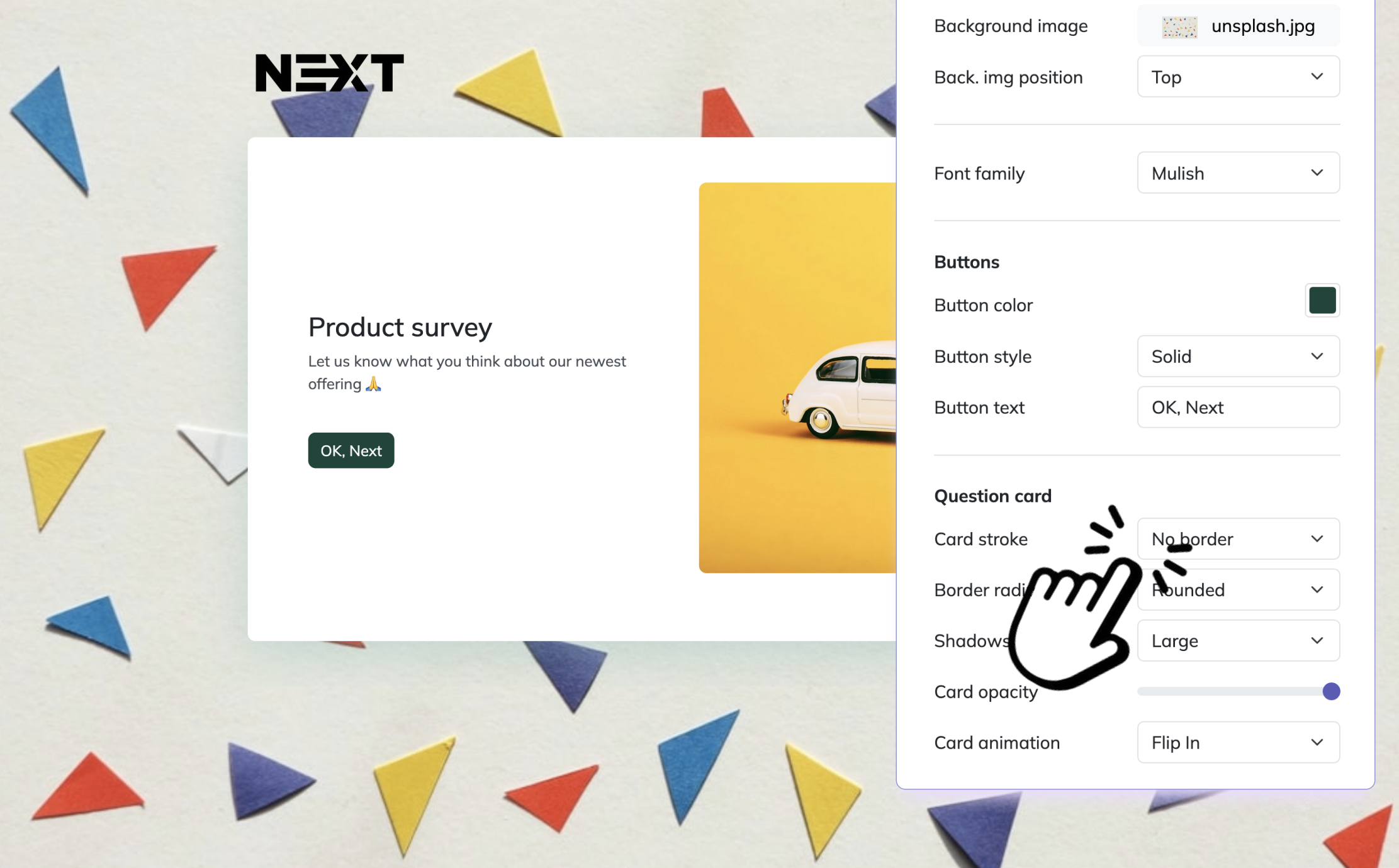
28 Health Care Satisfaction Survey Questions for Better Feedback
Discover 25 expert health care satisfaction survey questions designed to boost patient feedback a...
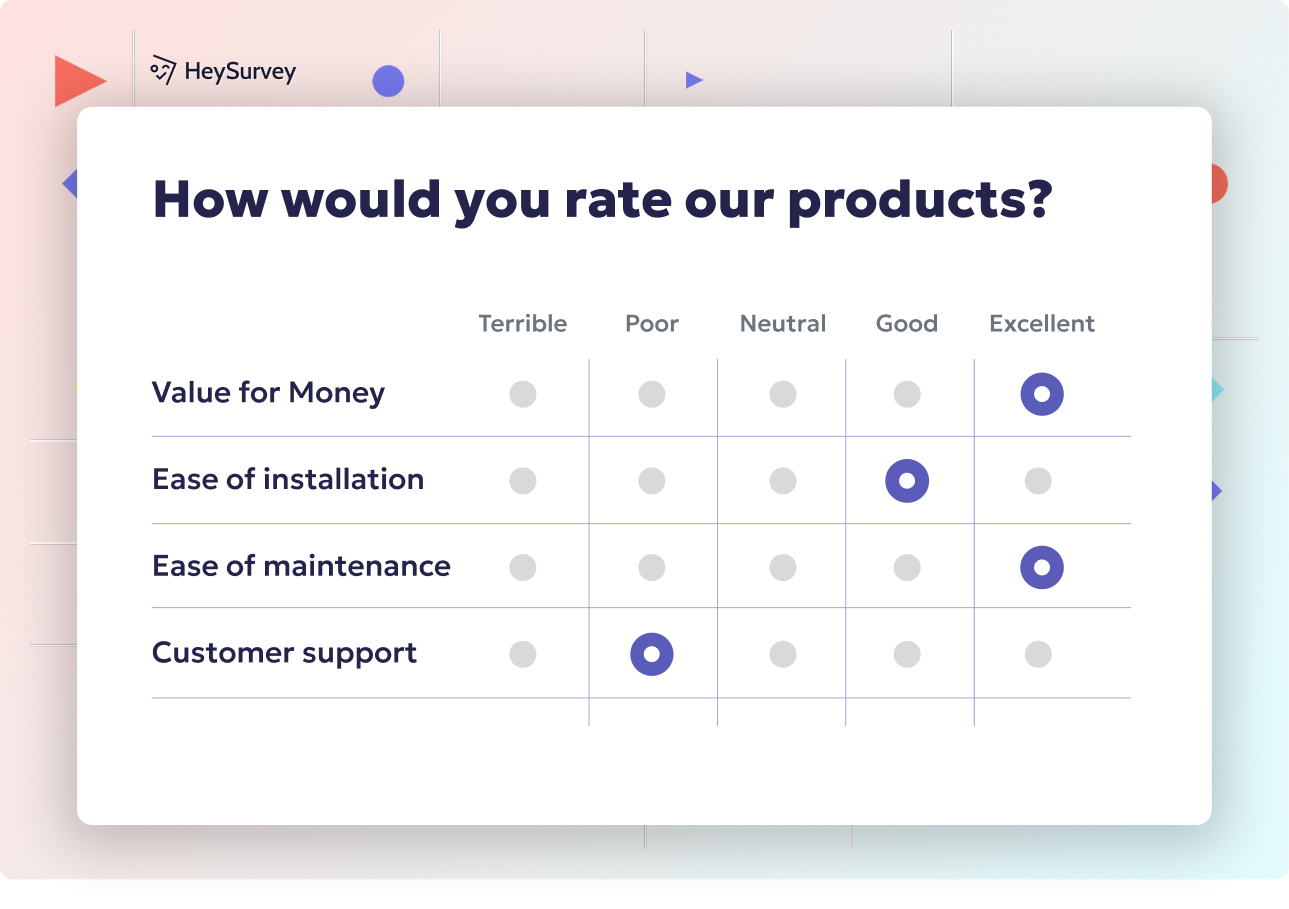
31 Body Image Survey Questions: Types, Usage & Best Guide
Discover 35 expert body image survey questions across 7 proven types to measure body satisfaction...
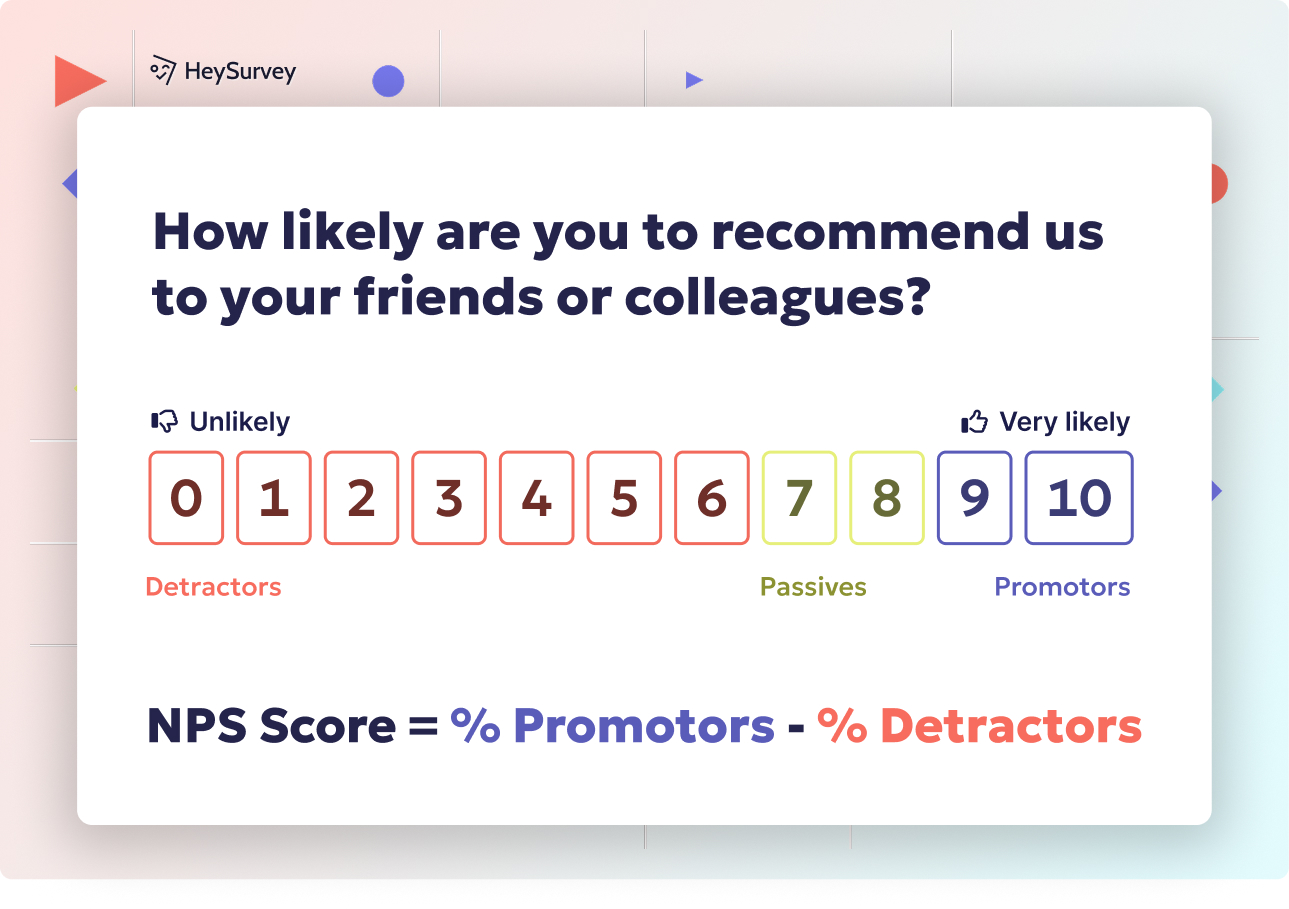
31 Essential Domestic Violence Survey Questions: Types & Uses
Explore 30+ domestic violence survey questions covering types, uses, samples, and best practices ...
